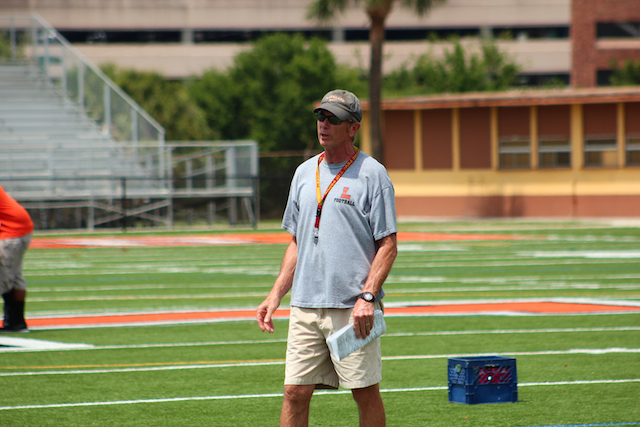“The answer to this is very subjective. It really depends on how the coaching is being accepted by the athlete.” East Bay head football coach, Frank Larosa expressed. “In my opinion, hard coaching is a coaching style that is very demanding on the athlete. When a coach demands academic excellence, great attendance in school and sports activities, great effort in the weight room…that could be hard coaching!” In an area widely accepted as DIFFERENT more than anything else, there is a very thin line between hard coaching and abusive treatment.
At the high school age kids are so impressionable, vulnerable and confused. Many times today’s athlete has been pampered and put on a pedestal at a young age making it extremely difficult for a high school coach to coach him hard in an attempt to help a player reach his max potential. “Coaching a kid hard is coaching effort.” Leto Head Coach, Matt Kitchie stated. Out at Spoto High School, Head Coach Dale Caparaso reiterates what Kitchie said. “Very fine line. In my opinion and experience it is not a matter of what comes out of your mouth but what goes into the ear of the player. I believe if a young man knows you care for him, want what is best and love him it helps when you are firm and or hard. If the player does not believe in you then even the most mild form of ‘hard’ coaching can be taken badly. They must know you care!”
How does a coach walk that line? How do they make sure they get through to the player without the player tanking and feeling personally attacked? “Never is it OK to attack a kids’ Talent or personal character. Effort can make an average player good, but It’s never going to be productive if you attack a kids’ personalty. Also if you have a relationship on and off the field where the young man knows on the field ‘It is not personal’ you can be hard on the kid, with out it spilling into personal feelings!” said Kitchie.
So many coaches give it 100% effort daily. With family at home and a full day of work awaiting, they still give top effort for very little pay. “Hard coaching is coaching with passion and instilling a great work ethic, integrity and character in the kids through discipline and hard work. “Teaching them to go and dig-in even when they mentally don’t feel they can.” That’s what Head Coach Mike Smith, Head Coach at Zephyrhills Christian expressed. The philosophy that coaching is not a hobby should also be emphasized; and passionately. East Lake’s Bob Hudson puts this thought-process into perspective. “Coaching hard to me is a nonstop job.” said Hudson. “It means constantly teaching and reinforcing the things you want to teach; it’s both on and off the field.”
Every kid is different and treating a player fairly may not equal treating him the same way. “It’s all in the eyes of the beholder but the one thing each coach has to understand is, he has to first know the players on a certain level to be able to coach them hard and then he has to understand what makes each player tick” Said Keith Chattin.
Do you agree with Keith Chattin, Lennard? Many will. So as one player may feel he is being treated unfairly, he may not be mistreated or abused.
“Tampa Bay Tech’s Jayson Roberts knows how NOT to try and reach a kid effectively. “Only acknowledge the players’ shortcomings.” He said. “Asking the players to go all-out for their team, but the coach will not go all-out for the players; telling the players he is soft to not good enough instead of saying that about his play or effort.”
Head Coach Greg Meyer at Plant City confirms this method that Roberts is speaking-of isn’t going to work either “Abusive coaching in contrast is where there is a constant negative breakdown of the player without the build up needed for teachable moments to be effective.”
“They are kids.” said Palm Harbor University High’s Reggie Crume. “They will make mistakes. They are a t a very pivotal point in their mental and physical development. The best coaches can recognize how to motivate different types of kids.” Gaither’s Jason Stokes simply put his view about this subject in a pretty easily understood stance. “It’s extremely important for a kid to believe his or her coach has confidence in them.”
Perhaps Lakeland Christian’s Wayne Peace gives us the best summary of the end game as this high stakes game of “when-to-say-when” as a coach/mentor/surrogate parent in our culture becomes an even bigger battle; “My job as a high school coach is to motivate, encourage, push and to love my players. My job is to strive to have them leave my program a better man than when they arrived on campus.”
